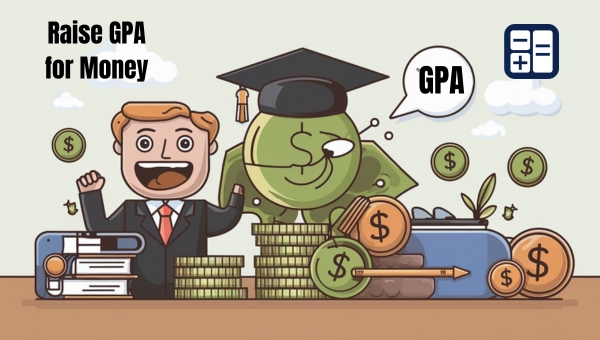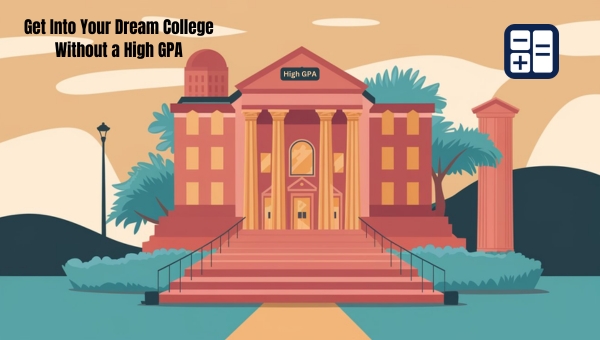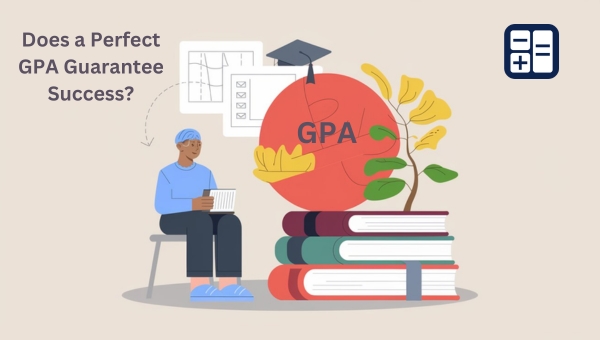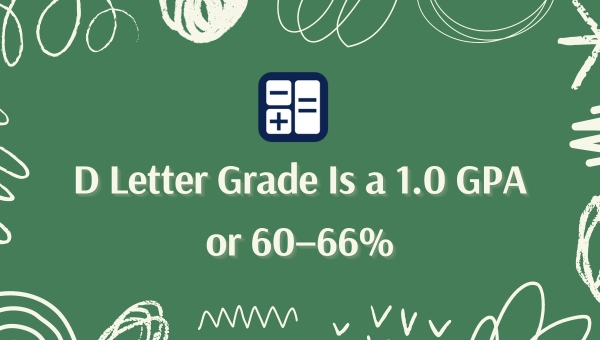B+ Letter Grade Is a 3.3 GPA or 87–89%
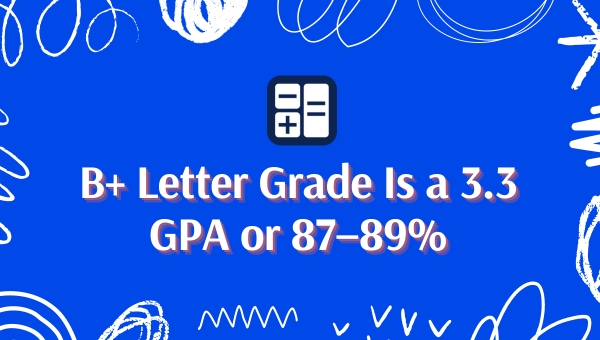
When you see a B+ on your report card, you’re looking at a GPA of 3.3 or a percentage range of 87% to 89%. This grade shows you have a strong grasp of the material, though there’s room for improvement. It signifies that you’re capable of tackling challenging coursework and consistently putting in the effort.
But what does this mean for your future, especially in terms of college admissions or career prospects? Let’s explore how a B+ GPA can impact your academic journey and what strategies can help you maintain or even boost this grade.
What is a B+ GPA?
A B+ GPA typically represents a solid performance just shy of excellence. When you earn a B+ in your courses, it translates to a GPA of approximately 3.3 on a 4.0 scale.
This grade range falls between 87% and 89% in terms of percentage scores. A B+ indicates that you’ve demonstrated a good understanding of the material, though there might be some areas for improvement.
You’re likely putting in consistent effort, attending classes regularly, and completing assignments on time. However, you mightn’t be fully mastering all the nuances of the subject matter. It’s a respectable GPA that shows you’re above average, but there’s still room to push a bit harder if you’re aiming for an A or A+.
In many academic settings, a B+ is seen as a strong grade. It can be a good indicator of your ability to handle challenging coursework and manage your time effectively.
If you’re planning to apply for college or graduate school, a B+ GPA shows that you’re a capable student who can succeed in demanding environments. Keep striving, and with a bit more effort, you could bump that grade up to an A.
What does a B+ GPA mean for high school students?
A B+ GPA can shape your college application strategy by influencing your choice of safety, target, and dream schools. You’ll likely be a strong candidate for safety schools, while target schools will see you as a competitive applicant.
However, for dream schools, a B+ GPA may require you to enhance your application with strong extracurriculars and essays.
Safety Schools
With a B+ GPA, high school students often wonder about their college options, particularly safety schools. These institutions are crucial because they increase your chances of acceptance and provide a solid backup plan. A B+ GPA of 3.3 or 87-89% can make you a competitive applicant at many safety schools.
When considering safety schools, look for colleges where the average GPA of admitted students is slightly below or on par with your own.
Here are some key points to keep in mind:
- Match Your GPA: Choose schools where your B+ GPA aligns with or exceeds their average admission criteria.
- Financial Safety: Opt for institutions offering robust financial aid or lower tuition to ensure affordability.
- Strong Programs: Focus on schools with strong programs in your intended major or interest area.
- Acceptance Rates: Target schools with higher acceptance rates to increase your chances of getting in.
- Campus Culture: Consider the campus environment and culture to ensure it’s a good fit for you.
Target Schools
Now that you’ve considered safety schools, it’s time to explore target schools that align well with a B+ GPA. A B+ GPA, translating to a 3.3 or 87-89%, opens doors to many reputable institutions where you can thrive academically.
Target schools are those where your GPA falls within the middle 50% range of admitted students, meaning you’ve got a solid chance of acceptance.
Here are some key factors to consider when identifying target schools:
- Academic Programs: Look for schools that offer strong programs in your areas of interest.
- Campus Culture: Consider whether the school’s social and extracurricular environment suits your personality and interests.
- Location: Think about whether you prefer an urban, suburban, or rural setting.
- Class Size: Decide if you thrive in smaller classes with more personal attention or larger lecture-based courses.
- Financial Aid: Investigate the availability of scholarships, grants, and other financial aid options.
Dream Schools
Dream schools often seem like a distant aspiration for students with a B+ GPA, but they shouldn’t be dismissed outright.
A 3.3 GPA or 87–89% can still open doors to prestigious institutions if you leverage your strengths and present a well-rounded application. Admissions officers look for more than just grades, so it’s essential to highlight other aspects of your profile.
- Extracurricular Activities: Showcase your involvement in clubs, sports, or volunteer work.
- Leadership Roles: Emphasize any leadership positions you’ve held, such as club president or team captain.
- Strong Essays: Craft compelling personal statements that reveal your unique story and aspirations.
- Recommendations: Obtain glowing letters of recommendation from teachers who know you well.
- Standardized Test Scores: Aim for high scores on the SAT or ACT to bolster your application.
Your B+ GPA is just one piece of the puzzle. Highlighting your dedication, passion, and achievements in other areas can make a big difference.
Dream schools appreciate diverse talents and backgrounds, so don’t underestimate the value of your unique experiences. With a strategic approach, you can turn your dream school into a reality.
Proven Tips to Get a B+ GPA
Achieving a B+ GPA isn’t just about hitting the books; it’s also about how you manage your time and engage in class.
Effective study techniques, active participation, and utilizing office hours can make a big difference.
Don’t forget to balance your studies with a healthy lifestyle for overall success.
Effective Study Techniques
Securing a B+ GPA requires more than just attending classes and completing assignments; it demands strategic and effective study techniques.
To start, always take comprehensive notes during lectures. Don’t just jot down what’s on the slides; listen actively and capture key points, examples, and explanations given by the instructor.
Next, create a study schedule that includes regular review sessions. Instead of cramming the night before, break your study material into manageable chunks and review them consistently. This method, known as spaced repetition, helps reinforce your memory and understanding over time.
Engage actively with the material by summarizing information in your own words, teaching concepts to a friend, or creating flashcards for quick self-quizzing. This active recall process boosts retention and comprehension.
Don’t underestimate the power of study groups. Collaborating with classmates can expose you to different perspectives and explanations, deepening your understanding of complex topics.
However, ensure the group stays focused and on-topic.
Time Management Strategies
While effective study techniques lay a solid foundation for academic success, managing your time efficiently is equally important for achieving and maintaining a B+ GPA. Start by creating a detailed weekly schedule.
Allocate specific time slots for attending classes, studying, completing assignments, and taking breaks. This ensures that you’re not cramming last minute and can consistently stay on top of your workload.
Use a planner or digital calendar to keep track of important deadlines and exams. Setting reminders a week or two in advance can help you avoid any last-minute surprises.
Divide larger tasks into smaller, manageable chunks and tackle them one step at a time. This approach minimizes overwhelm and helps you maintain steady progress.
Avoid multitasking. Focus on one task at a time to improve both efficiency and quality. Set clear, achievable goals for each study session, and take regular, short breaks to stay fresh and focused.
Prioritize tasks based on their due dates and importance. Learn to say no to unnecessary distractions and commitments. Remember, it’s okay to ask for help if you’re struggling to manage your time.
Utilize campus resources like tutoring centers or study groups to maximize your productivity.
Active Class Participation
Active class participation plays a crucial role in securing a B+ GPA. When you actively engage in class discussions, you’re more likely to retain information and understand complex topics.
Don’t just be a passive listener; ask questions when you’re confused and contribute to discussions to show your interest and understanding.
To make the most out of class time, come prepared. Read the assigned materials and review your notes before class. This preparation allows you to follow along with lectures more easily and participate meaningfully.
Additionally, sitting at the front can help you stay focused and more involved. Group activities and peer discussions are excellent opportunities to demonstrate your engagement. When working with classmates, share your thoughts and ideas actively.
This not only helps you learn but also shows your enthusiasm and commitment to the material.
Utilizing Office Hours
Taking advantage of office hours can really boost your GPA to a B+ or higher. When you attend these sessions, you get one-on-one time with your professor to clarify difficult concepts and ask specific questions about the material. Don’t wait until you’re struggling; make it a habit to go regularly to stay ahead.
Prepare before you go. Review your notes and identify what you’re having trouble with. Write down your questions so you can make the most of your time. Professors appreciate students who are proactive and prepared, which can positively influence their perception of you.
Use this time to discuss exams and assignments. Ask for feedback on your work and inquire about ways to improve. Understanding what your professor expects can help you tailor your study habits and assignments to meet those standards.
Show initiative by discussing additional resources. Professors can recommend books, articles, or even strategies that you mightn’t have considered. This can deepen your understanding and give you an edge in your studies.
Lastly, building a rapport with your professor can be beneficial. They may offer extra help or insights that aren’t available during regular class time. Consistent use of office hours is a strategic move toward achieving that B+ GPA.
Balanced Lifestyle Choices
How can balanced lifestyle choices impact your GPA? Maintaining a balanced lifestyle is crucial for achieving a B+ GPA or higher.
Start by prioritizing your sleep. Research shows that students who get 7-9 hours of sleep perform better academically. Lack of sleep can impair your memory and concentration, making it harder to grasp complex concepts.
Nutrition also plays a significant role. Eating a balanced diet rich in fruits, vegetables, and proteins can boost your brain function and energy levels. Avoid excessive caffeine and sugary snacks that lead to energy crashes.
Exercise is another key factor. Regular physical activity can improve your mood and reduce stress, making it easier to focus on your studies. Even a 30-minute walk can make a difference.
Time management is essential. Create a study schedule that balances academics, social life, and personal time. Use planners or apps to keep track of assignments and deadlines. This helps prevent last-minute cramming, which is often less effective.
Lastly, don’t neglect your mental health. Practice mindfulness or meditation to keep stress in check. Reach out for support when needed.
Balancing these aspects can significantly enhance your academic performance and help you achieve that B+ GPA.
How to Raise Your GPA Fast?
Boosting your GPA quickly requires a strategic and proactive approach. First, prioritize your assignments and exams. Focus on high-weighted tasks that significantly influence your grades. Review syllabi to understand where to allocate your efforts for maximum impact.
Next, improve your study habits. Break down study sessions into manageable chunks, use active learning techniques like summarization and teaching others, and avoid cramming. Utilize resources like tutoring centers, study groups, and online platforms to support your learning.
Engage actively in class. Participate in discussions, ask questions, and demonstrate your interest. Professors often notice engaged students and might offer extra help or opportunities for grade improvement.
Don’t be afraid to seek help. If you’re struggling, talk to your professors during office hours. They can provide insights, clarify doubts, and sometimes offer extra credit work.
Lastly, manage your time effectively. Use planners or digital tools to organize your study schedule, set reminders for deadlines, and balance your workload. Avoid procrastination by setting specific goals and rewarding yourself for meeting them.
Conclusion
Achieving a B+ GPA of 3.3 shows you’ve got a strong grasp of your coursework, landing you in the 87-89% range. It’s a solid foundation that demonstrates your capability and consistent effort.
By staying focused, attending classes regularly, and completing assignments on time, you can maintain or even improve your GPA. Remember, every bit of effort counts towards your academic success and future college prospects. Keep pushing yourself, and you’ll see great results!
